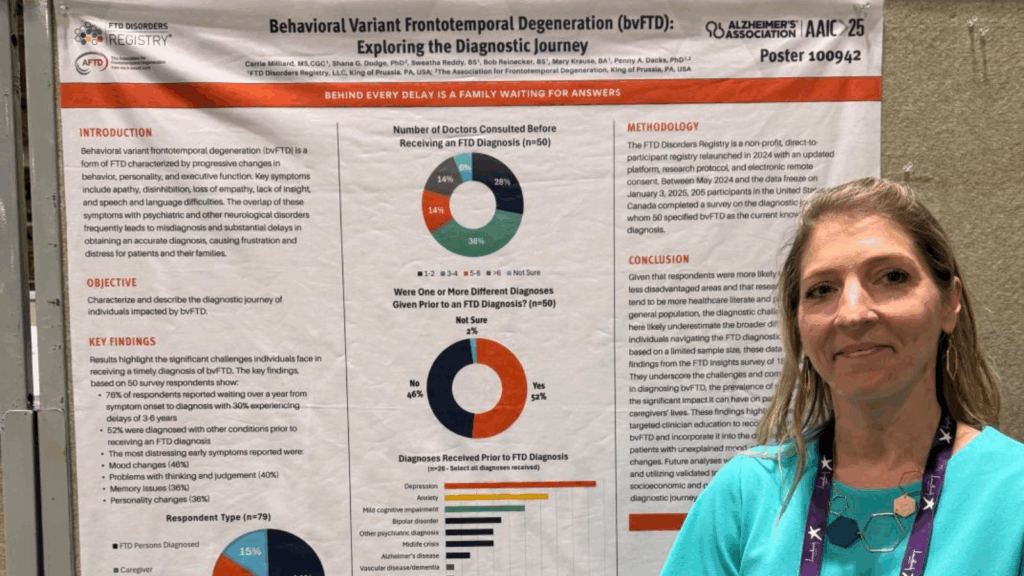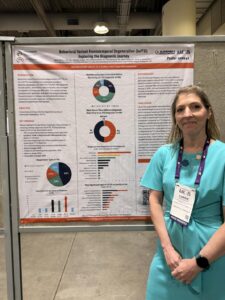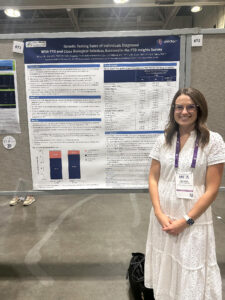PRESS & NEWS
Registry Data Featured at AAIC 2025

The FTD Disorders Registry showcased new insights at AAIC 2025.
The Alzheimer’s Association International Conference (AAIC) is the largest gathering of dementia researchers, clinicians, and advocates in the world. This year, the FTD Disorders Registry was proud to see data from the Registry featured in multiple presentations, underscoring the important role patient and caregiver insights play in advancing frontotemporal degeneration (FTD) research.
Registry Data on Genetic Testing in FTD
One of the posters, presented by Devon M. Chenette of Alector, analyzed results from the Registry’s FTD Insights Survey to better understand genetic testing rates among people diagnosed with FTD and their close biological relatives.
Although a significant percentage of FTD cases are caused by genetic mutations, the study found that fewer than one in four individuals with FTD had received genetic testing. The highest testing rates were seen in the subgroup of people with both FTD and ALS, and testing was more common when there was a known family history of disease.
These findings point to a troubling gap. Low rates of genetic testing make it harder for families to assess inherited risk, and they may prevent eligible individuals from participating in clinical trials of therapies designed for genetic forms of FTD. The study highlights an urgent need to:
- Increase awareness among healthcare providers about the role of genetic testing in FTD.
- Ensure that families affected by FTD are connected to genetic counseling.
- Address barriers to testing, such as cost, insurance coverage, and access to specialized clinicians.
Together, these steps can help families make informed decisions while also supporting the development of new treatments.
Understanding the Diagnostic Journey in bvFTD
 A second Registry poster, Behavioral Variant Frontotemporal Degeneration: Exploring the Diagnostic Journey, was presented by Director Carrie Milliard on behalf of the Registry.
A second Registry poster, Behavioral Variant Frontotemporal Degeneration: Exploring the Diagnostic Journey, was presented by Director Carrie Milliard on behalf of the Registry.
The poster explored the lived experiences of individuals navigating the path to a bvFTD diagnosis, a condition often marked by personality and behavioral changes that can be mistaken for psychiatric or mood disorders.
The findings showed:
- Misdiagnosis is common – leading to delays in proper care.
- The emotional and financial burden on patients and caregivers can be profound.
- Despite being based on a relatively small sample, the results aligned with earlier FTD Insights Survey data from over 1,800 participants, reinforcing the validity of these concerns.
These findings call for greater clinician education to help providers recognize bvFTD earlier and consider it in the differential diagnosis for patients with unexplained cognitive, mood, or personality changes. The Registry team is planning future analyses with larger sample sizes and validated tools to further understand how factors such as geography and socioeconomic status shape the diagnostic journey.
FTD and the Criminal Legal System
In addition to Registry-led research, the Registry supported recruitment for a poster presented by Victoria Helmly, MSW, PhD, through the AFTD Holloway Postdoctoral Fellows Program: Frontotemporal Dementia and the Criminal Legal System: Care Partner Stories.
This study explored the intersection of FTD symptoms and the criminal legal system, highlighting how behavioral changes driven by the disease can lead to devastating consequences for individuals and their families. Care partner perspectives provided crucial insights into how healthcare, legal, and community systems can better respond when FTD symptoms result in contact with law enforcement.
Why It Matters
Each of these studies demonstrates how real-world data collected by the Registry adds depth and perspective to scientific research. By sharing the lived experiences of people diagnosed with FTD and their caregivers, Registry data helps identify gaps in care, inform clinical trial readiness, and guide education efforts that can improve lives today.
Presentations at AAIC showcase the Registry’s commitment to collaboration and its value as a trusted resource for the research community. Together, these efforts move us closer to better understanding, earlier diagnosis, and ultimately, effective treatments for FTD.
Together we can find a cure for ftd
The FTD Disorders Registry is a powerful tool in the movement to create therapies and find a cure. Together we can help change the course of the disease and put an end to FTD.
Your privacy is important! We promise to protect it. We will not share your contact information.




